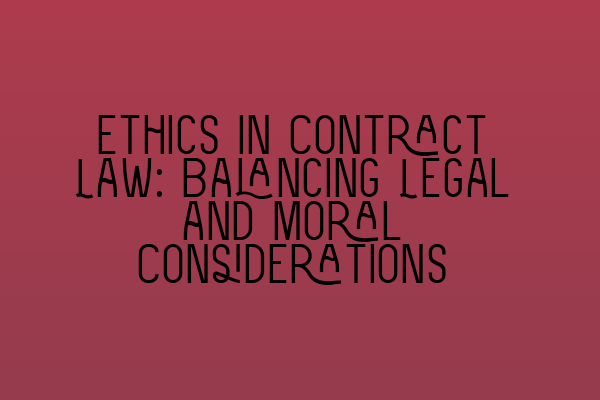Ethics in Contract Law: Balancing Legal and Moral Considerations
Introduction:
Contracts are the backbone of business transactions and personal agreements, serving as a legal framework that outlines the rights and obligations of all parties involved. However, behind the strict legalities of contract law lies a deeper consideration of ethics, encompassing the moral responsibilities and fairness within these agreements. In this blog post, we will explore the delicate balance between legal and moral considerations in contract law and how they influence the decision-making process.
Understanding Ethics in Contract Law:
Contracts are governed by legal principles, often influenced by statutory provisions, common law, and judicial decisions. While legal standards set the groundwork for enforceability and protection of parties’ interests, ethics play a crucial role in shaping the behavior and actions within the contractual relationship.
Key Factors Influencing Ethical Decision-Making:
1. Honesty and Good Faith: A fundamental ethical principle in contract law is the duty of good faith and fair dealing. Parties are expected to act honestly, truthfully, and without deceptive intentions. Failure to adhere to these standards may lead to a breach of contract or a claim of misrepresentation.
2. Equitable Treatment: Contract law aims to ensure fairness and equal treatment for all parties involved. Ethical considerations push for the avoidance of unfair advantage or exploitation of vulnerabilities. Each party should negotiate and perform the contract in good faith, taking into account the interests and reasonable expectations of all stakeholders.
3. Consideration of Public Interest: Contracts can impact society at large, as they shape business practices, consumer rights, and public welfare. Ethical decision-making requires considering the potential effects of contractual terms on public interest. For instance, contracts that promote discrimination or harmful environmental practices may be viewed as unethical and face legal consequences.
4. Compliance with Legal and Regulatory Standards: While ethics in contract law transcend mere compliance, it is essential to align ethical behavior with legal and regulatory requirements. Adherence to laws, contracts, and industry norms helps maintain ethical standards by providing a baseline for acceptable conduct.
Challenges in Balancing Legal and Moral Considerations:
1. Subjectivity: Determining what is morally right or wrong can be subjective, varying between individuals or cultures. Different ethical frameworks can lead to conflicting viewpoints on contractual obligations, making it challenging to strike a universally acceptable balance.
2. Business Pressures: In a highly competitive business environment, companies may face pressures to prioritize self-interest over moral considerations. Profit maximization and financial gain can sometimes overshadow ethical decision-making, potentially leading to unethical contractual practices.
3. Unforeseen Circumstances: Contracts are often drafted with future uncertainties in mind. Unforeseen events or change in circumstances can raise complicated ethical dilemmas. Parties may be compelled to renegotiate or modify the contract to accommodate new moral concerns or unforeseen hardships.
Conclusion:
Ethics in contract law go beyond the strict application of legal principles, encompassing moral considerations that impact the fairness, honesty, and equitable treatment of parties involved. Striking a balance between legal and moral obligations is crucial for maintaining ethical standards in contractual relationships. By upholding principles of honesty, good faith, equity, and considering the public interest, contract law can foster ethical behavior in business dealings and protect the rights and interests of all parties involved. It is imperative for individuals and organizations to recognize the importance of ethics and continue to navigate the intricate terrain of contract law while upholding moral values.
